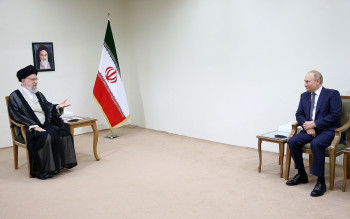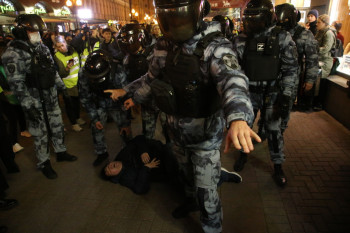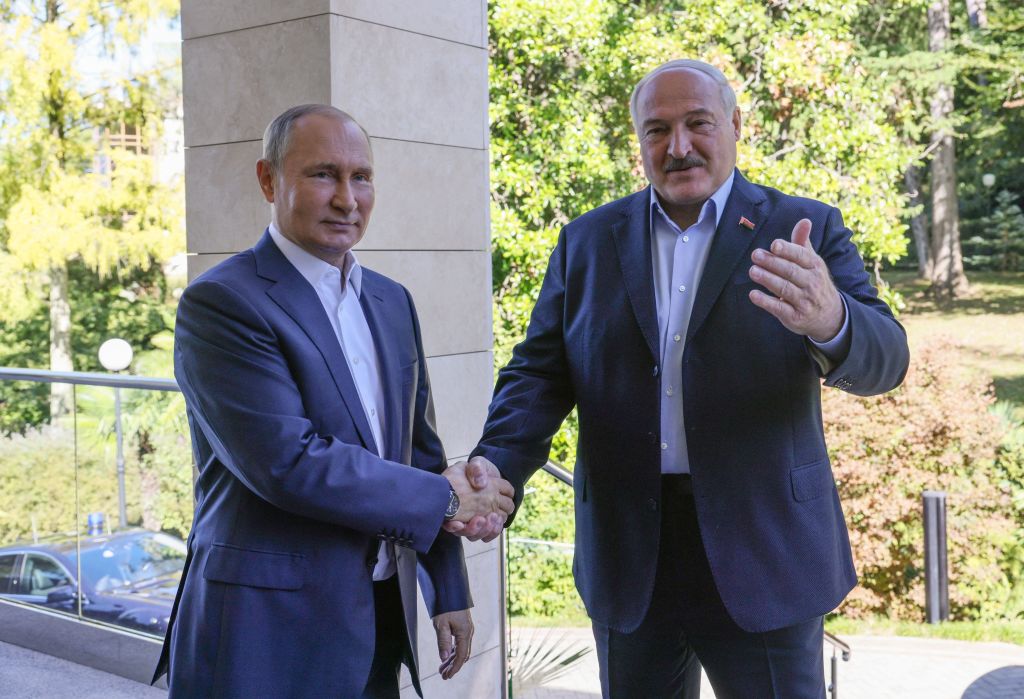Russian Defense Minister Sergei Shoigu visits Belarus as Minsk and Moscow sign a rushed classified protocol on regional security.
Belarus’ parliament is considering introducing the death sentence for officials and military personnel that “commit acts of treason.”
Belarus dictator Alexander Lukashenko extends the list of criminal charges for which trials in absentia can be conducted, adding financial crimes to the list.
While Ukrainian officials say the direct involvement of Belarus in Russia’s war is unlikely, Ukraine’s military conducts drills along its northern border.
Belarusian opposition creates the ‘free digital state,’ aimed at uniting Belarusians.
Belarus returned prominent opposition leader Maria Kalesnikava to a penal colony following her emergency surgery last week.
Human rights activists report 354 people were detained for political reasons in November, averaging 11 arrests daily. The cumulative sentence handed down to political prisoners in November reached 213 years of imprisonment.
Belarus, Russia sign protocol on regional security
On Dec. 3, Russian Defense Minister Shoigu and his Belarusian counterpart Viktor Khrenin signed a protocol on amendments to the countries’ joint regional security agreement dated back to 1997.
Belarusian authorities have not disclosed the amendments.
According to Belarusian state media, the defense ministers discussed bilateral military cooperation.
Belarusian monitoring group Belarusian Hajun said the protocol was signed at Machulishchy air base, which is “very atypical and only emphasizes a certain haste.”
Following the signing of the protocol, Shoigu met with Lukashenko in Minsk. During the meeting, Lukashenko openly acknowledged that Minsk and Moscow are training troops in Belarus.
According to Andrii Yusov, a spokesperson for the Ukrainian Defense Ministry’s Main Intelligence Directorate, Shoigu’s visit to Minsk may have been intended to pressure Belarus into joining Russia’s full-scale war against Ukraine.

Belarus to introduce death penalty for officials, military personnel for ‘treason’
On Dec. 7, the Belarusian parliament’s lower chamber voted in the first reading to amend the country’s criminal code, introducing the death penalty for officials and military personnel that commit treason, according to Lukashenko’s regime.
“The bill aims at preemptive measures against extremist (terrorist) crimes to be taken through the adjustment of the Criminal Code and the Criminal Procedure Code of the Republic of Belarus,” according to the document.
The amendments introduced punishment for “discrediting the Belarusian military.” A fine for crimes against the state ranging from approximately $6,450 to $644,900 was also proposed.
The bill has yet to be approved by the Belarusian parliament’s upper chamber and signed by Lukashenko.
Ukraine conducts military drills at Belarusian border
Ukraine’s military conducted tactical exercises simulating responses to attacks on Kyiv from Ukraine’s northern border with Belarus, according to Oleksandr Pavliuk, the deputy commander of Ukrainian Ground Forces.
The drills reportedly involved the 120th Separate Territorial Defense Brigade and subordinate military units.
On Dec. 6, Ukraine’s Defense Intelligence Chief Kyrylo Budanov said he doesn’t think there will be an attack on Ukraine from Belarus.
He said that rumors of direct involvement by Belarus are intended to “sow panic among society and divert our (Ukrainian) forces and means from real hostilities on the front line.”
Ukraine’s Lieutenant General Serhii Naiev reiterated Budanov’s statement, noting that there is no direct threat from Belarus.
Lukashenko approves in absentia trials for financial crimes
On Nov. 29, Lukashenko approved in absentia trials for those convicted of economic crimes in Belarus.
Those implicated in the trials may risk losing their Belarusian citizenship and having their assets seized by the state.
On July 21, Lukashenko signed legislation permitting trials in absentia for 47 Belarusian Criminal Code articles.
The amendments applied to charges of treason, terrorism, genocide, mercenaries, sabotage, riots, and the creation or participation in “extremist organizations.” Many of these charges are used to justify the persecution of political activists in Belarus.
Belarusian opposition creates ‘free digital state’
Belarusian software developers Pavel Liber and Yaroslav Likhachevsky announced the launch of the Digital Belarus project on Dec. 2.
The online platform allows Belarusians – those residing in the country and abroad – to “unite, search for jobs, arrange projects, and make joint decisions.”
“This is an opportunity for those who stayed in the country to participate online in cultural, social, and, later, political life,” the project’s creators said.
Liber said that, in a broad sense, Digital Belarus is a platform where “Belarusians can safely and openly discuss issues that concern them, agree on how to live on, and build their lives and destiny in the future.”
Thousands of Belarusians have been arrested, jailed, and harassed since Lukashenko rigged the 2020 Belarusian presidential election, triggering the largest protests in the country’s history.
Jailed opposition leader Maria Kalesnikava returns to penal colony following emergency surgery
On Dec. 5, Belarusian opposition leader Maria Kalesnikava was transferred from a hospital in Belarus’ Homiel region back to the penal colony where she is serving her prison sentence.
Diagnosed with a perforated ulcer, Kalesnikava was admitted to the hospital on Nov. 28 for emergency surgery. According to her father, the medical staff treating Kalesnikava were reportedly made to sign non-disclosure agreements regarding her condition.
Kalesnikava’s family had told the Guardian that she was in a “grave but stable condition.”

Kalesnikava worked alongside Belarusian opposition leader Sviatlana Tsikhanouskaya and Veronika Tsepkalo following the fraudulent 2020 Belarusian presidential election, in which incumbent autocrat Lukashenko was declared the winner.
She has been imprisoned for over two years after resisting expulsion from Belarus.
While the Belarusian KGB attempted to force her to leave Belarus in 2020, she tore up her passport and returned to Belarus, where she was immediately detained and sentenced to 11 years in prison.













